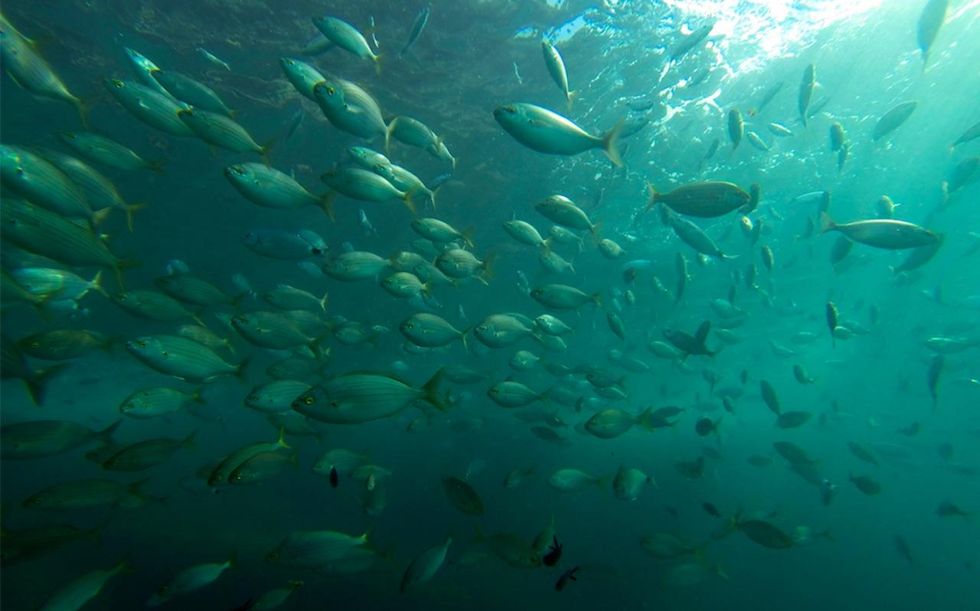Scientists have admitted "mistakes" in a major study that said the oceans are warming faster than previously thought, the Washington Post reported — and one of the study's co-authors offered a rather jaw-dropping response to it all.
The study — published Oct. 31 in the journal Nature — concluded that ocean warming “is at the high end of previous estimates” and suggested the rate of global warming itself could be more accelerated as well, the paper reported, and that there may be less time to fight greenhouse gas emissions as a result.
The Post covered the initial findings, and the scientists' conclusions drew "considerable media attention," the paper added.
Then a different set of eyes took a look
An independent Britain-based researcher published a lengthy blog post saying he had found a “major problem” with the research, the Post reported.
“So far as I can see, their method vastly underestimates the uncertainty,” Nicholas Lewis told the paper in an interview Tuesday, “as well as biasing up significantly, nearly 30 percent, the central estimate.”
Lewis added to the Post that he tends “to read a large number of papers, and, having a mathematics as well as a physics background, I tend to look at them quite carefully, and see if they make sense. And where they don’t make sense — with this one, it’s fairly obvious it didn’t make sense — I look into them more deeply.”
More from the Post:
Lewis has argued in past studies and commentaries that climate scientists are predicting too much warming because of their reliance on computer simulations, and that current data from the planet itself suggests global warming will be less severe than feared.
It isn’t clear whether the authors agree with all of Lewis’s criticisms, but [study co-author Ralph] Keeling said “we agree there were problems along the lines he identified.”
What happened next?
With that, the study's authors submitted corrections to the journal, the Post said, and the Scripps Institution of Oceanography — where several researchers involved in the project are based — acknowledged problems in the scientists' work and corrected a news release on its website which had said our oceans “have absorbed 60 percent more heat than previously thought.”
How did one of the scientists behind the study respond?
“Unfortunately, we made mistakes here,” Keeling, also a climate scientist at Scripps, told the Post.
He then added the following observation to the paper: “I think the main lesson is that you work as fast as you can to fix mistakes when you find them.”
One might argue a better "main lesson" is to approach the data more carefully prior to publication. But why quibble?
More from the Post:
The central problem, according to Keeling, came in how the researchers dealt with the uncertainty in their measurements. As a result, the findings suffer from too much doubt to definitively support the paper’s conclusion about how much heat the oceans have absorbed over time.
The central conclusion of the study — that oceans are retaining ever more energy as more heat is being trapped within Earth’s climate system each year — is in line with other studies that have drawn similar conclusions. And it hasn’t changed much despite the errors. But Keeling said the authors' miscalculations mean there is a much larger margin of error in the findings, which means researchers can weigh in with less certainty than they thought.
“I accept responsibility for what happened because it’s my role to make sure that those kind of details got conveyed,” Keeling added to the paper.
The study’s lead author was Laure Resplandy of Princeton University, the Post reported, adding that other researchers were with institutions in China, Paris, Germany, and the U.S. National Center for Atmospheric Research and Geophysical Fluid Dynamics Laboratory.
How did the journal that published the study respond?
“Maintaining the accuracy of the scientific record is of primary importance to us as publishers and we recognize our responsibility to correct errors in papers that we have published,” Nature said in a statement to the Post. “Issues relating to this paper have been brought to Nature’s attention and we are looking into them carefully. We take all concerns related to papers we have published very seriously and will issue an update once further information is available.”
Nature's website says it publishes "the finest peer-reviewed research in all fields of science and technology on the basis of its originality, importance, interdisciplinary interest, timeliness, accessibility, elegance and surprising conclusions."
What did other scientists have to say?
Paul Durack, a research scientist at the Lawrence Livermore National Laboratory in California, told the Post that despite the study's errors, it "confirms the long known result that the oceans have been warming over the observed record, and the rate of warming has been increasing."
Gavin Schmidt, head of the NASA Goddard Institute for Space Studies, seemed particularly forgiving in regard to the mistakes in the climate study, telling the paper that errors "sometimes slip through” despite researchers' best efforts.
“The key is not whether mistakes are made, but how they are dealt with — and the response from Laure and Ralph here is exemplary. No panic, but a careful reexamination of their working — despite a somewhat hostile environment,” Schmidt added to the Post. “So, plus one for some post-publication review, and plus one to the authors for reexamining the whole calculation in a constructive way. We will all end up wiser."
Here's how CBS News contributing meteorologist Jeff Berardelli reacted to the study just after it was published:




